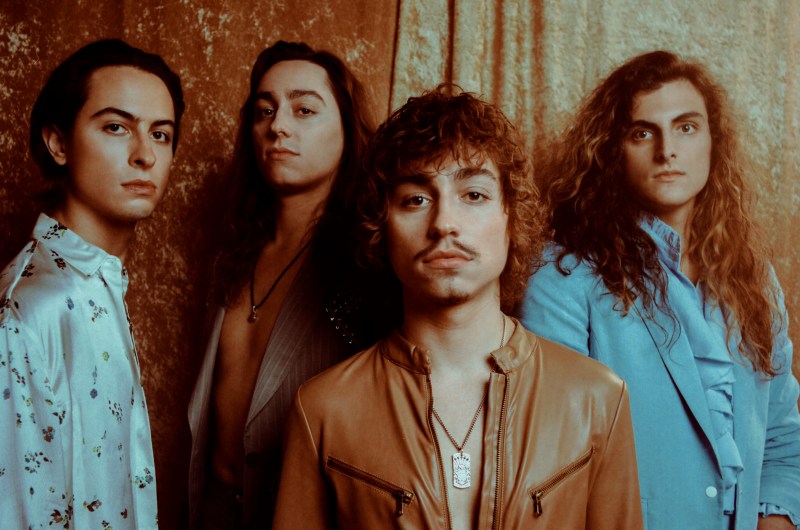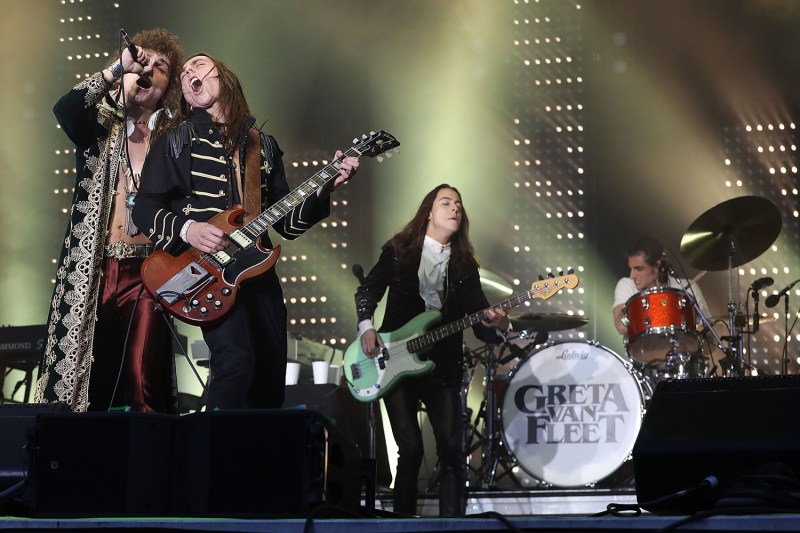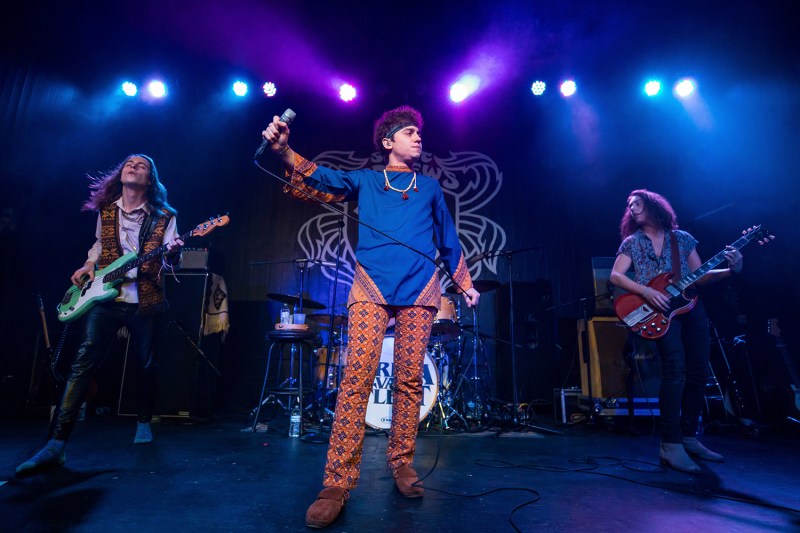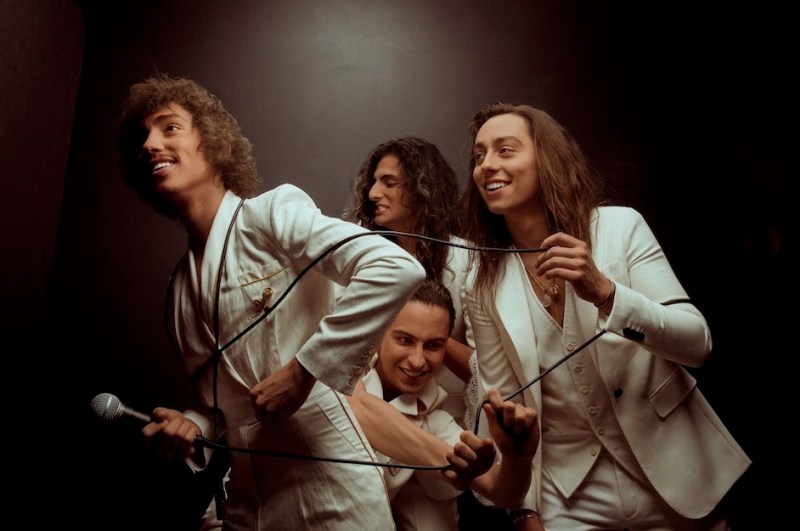
At some point over the weekend, the members of rock band Greta Van Fleet were robbed. At their management space in Nashville — aka the crime scene — various employees speak in hushed tones, trying to figure out exactly how their modern alarm system, with its sensors and cameras, was circumvented by a rock-throwing thief who climbed through a back window. He or she grabbed an armful of guitars, including guitarist Jake Kiszka’s first, a Gibson SG, and disappeared into the night. There, in the middle of the main room, an empty multi-instrument stand stood bare as an autumn tree.
Related Guides
But rolling up late, Kiszka and drummer Danny Wagner seem completely relaxed as they share a couch in a back room. Long hair over their shoulders, in T-shirts and necklaces, rings on their fingers, it’s just another day at the office. The plywood panel that patches the broken pane of glass is so close they could touch it.
“Maybe I look at it more like [the guitar] was a stepping stone, and it offered me something that stays with me,” Kiszka, 25, says, the tone of his voice suggesting it’s an interesting thought. “Now that it’s gone, it’s served its purpose.”
Where’s the nostalgia? I want to ask. Isn’t that what the pair’s band, with Kiszka’s twin Josh on vocals and their younger brother Sam on bass, all about? Most often summarized as a nostalgic act, critics accuse the band’s guitar-driven sound as lifted from Jimmy Page’s fingers and Robert Plant’s voice. Led Zeppelin is what everyone says, and because of this, critics postulate that the four-piece attracts the young and old, fans ages 8 to 80. Vanity Fair, in its profile of the band, asked, “Can Greta Van Fleet Build a Bridge Between Boomers and Generation Z?”

“It’s impossible for it to be classic rock,” Kiszka says. “If I go to bed tonight, I wake up tomorrow, I’m still going to be living in the world that surrounds me. We’re as contemporary as our flesh and blood.”
“We’ll always be humbled and honored by the references — [Zeppelin is] one of the greatest rock ‘n’ roll bands of all time,” he continues. “But we’re standing on the shoulders of the giants that came before us. It’s our generation’s job and purpose to reinvent and manipulate it and spit it out and see what we can do with that, culturally. And that’s what we’re doing.”
That’s not to say that the band is immune to the nonstop cycle of criticism, both genuine and snarky. Pitchfork called the band “all costume,” while Esquire referred to it as “Zeppelin-lite.” Truly there is no lack of creativity when it comes to describing why a band is not creative.
“Every band that we’re speaking of, they all had criticism,” says Wagner, 22. “If you don’t have that, no one’s talking, no one really cares that much.”
“If they’re mad, that’s great,” Kiszka adds, “but if they’re pissed off, then it’s fantastic.”
Ah, the critics, which includes this writer. We love the bands that we love and hate the bands we hate, diagramming musical lineages real or imagined (“I definitely hear some Pachelbel with a dash of Gregorian chant”). We are diligent algebra students, showing our work. But bands don’t play music or write songs for critics; they write them for themselves first and shortly after, for the fans. And so what does it illustrate, a band of early-20-year-olds who are shit on during every album cycle and nevertheless sell out arenas and amphitheaters?
Says Kiszka, “I think it proves that you can be criticized to death and still be successful.”
Greta Van Fleet is successful. Very, very successful. Its first single, “Highway Tune,” is well above 100 million streams and has appeared nearly everywhere, from a Ford v Ferrari trailer to the TV shows Shameless and Titans, as well as Super Bowl V and President Biden’s inauguration. No, wait, the song didn’t appear in those last two places, but it could have. And that’s the point: Greta Van Fleet sounds like it could have been anywhere, at any time, and that’s why its fans love it and queue for tickets.

When asked about their favorite slights and burns by the music literati, Wagner demurs: “I wish I had some fun ones, but we keep our noses out of it,” he says. But one of the common theories is that they’re just too young to have their own distinct sound. Rather than given time to mature, they were plucked at their midpoint from Frankenmuth, Michigan, and where others might spend a decade grinding out in shitty clubs around the U.S., working through their juvenilia, the four-piece was thrust into the spotlight, where they live in suspended animation.
Again, this is a misconception.
Greta Van Fleet was not scouted at the high school talent show. Founded in 2012 while they were still studying for tests, they nevertheless found management after their second performance and started earnestly playing gigs around the state at biker bars and other seedy venues. “We definitely experienced a wide spectrum: the shit, the goodness of all of it, the van breaking down,” Wagner says. “The pace we were at was actually quite nice: It wasn’t too long, it wasn’t too short. You had the experience, and you were able to work your way out of it.”
Whereas most bands get to know each other while sleeping in vans or Red Roof Inns, Greta Van Fleet literally grew up together, and in a small town. (Indeed, Wagner, ostensibly the most foreign body present, met bass player Sam in kindergarten.) When other bands were driving slow circles in a parking lot, trying not to hit orange cones, by the time its members graduated high school, Greta Van Fleet was on the on ramp, shifting into high gear, and merging onto the Autobahn. “Instead of missing out, I think there were more growing pains,” Kiszka says. “We were always understaffed.”
First came the 2017 EP Black Smoke Rising, which included the band’s first single, Highway Tune, and then an extended EP later that year, which included the four original songs plus four more. It earned the band four Grammy nominations, including a win for Best Rock Album. Anthem of the Peaceful Army, Greta Van Fleet’s debut record, was released in 2018, and then the sophomore The Battle at Garden’s Gate dropped in late 2020. That same year, the band relocated from its home state to Nashville, where Kiszka and Wagner say they’ve benefited from the city’s broad musical community, which extends far beyond country music.
“As a band in general, the amount of studio space and instruments and community that you can find with other musicians, making friends, collaborating, writing, it offers so much to a musician,” Wagner says. “Nashville has a way of taking care of you.”
Kiszka agrees: “It’s more a ‘Music City’ now than it’s ever been in the past.”
With a new record to promote and a country that’s unlocking bit by bit, Greta Van Fleet announced a four-city run of shows, including in Franklin, Tennessee; Bridgeport, Connecticut; Chicago; and finishing with a two-date run at the Greek Theatre in Los Angeles. Big shows with thousands of fans while promoting a new record would be galling for any band, let alone one that’s coming off a yearlong forced live-show hiatus. Both guys admit to a few nerves. But they’re more than ready for the return.
“If we wait any longer to get back on the road, we’re going to have another album,” Kiszka says, laughing. “[They’re] good, healthy nerves.”

“The ethos of our existence as musicians is live touring,” Wagner adds. “These songs are going to add something to the set that almost calms the nerves. You don’t have to worry about it as much, because it’s all there.”
Despite their successful history and vintage sound, Greta Van Fleet doesn’t seem to be looking back. Its members will talk with you about Bob Seger and Jack White and the greats of Motown — all Michigan legends and influences — with fluency. But they don’t linger. “The ‘Saviors of Rock ‘n’ Roll’ thing,” Kiszka says, laughing at the mantle that others thrust upon him and his band. The critics want them to be this way but not too much this way, to lead a genre that has, of late, stagnated.
The guitar, as he says, is running out of heroes.
“Is rock ‘n’ roll dead or is it in hiding or does it shape-shift?” Kiszka asks. A rhetorical question. He gives it a beat and then answers. “It’s hard to define rock ‘n’ roll as a genre,” he says.
He doesn’t reach for a textbook or read a critique. He thinks for a second. “It’s more a feeling,” he finishes. “If we say pop is a format, rock ‘n’ roll is then a philosophy. Rock is a lifestyle.”



